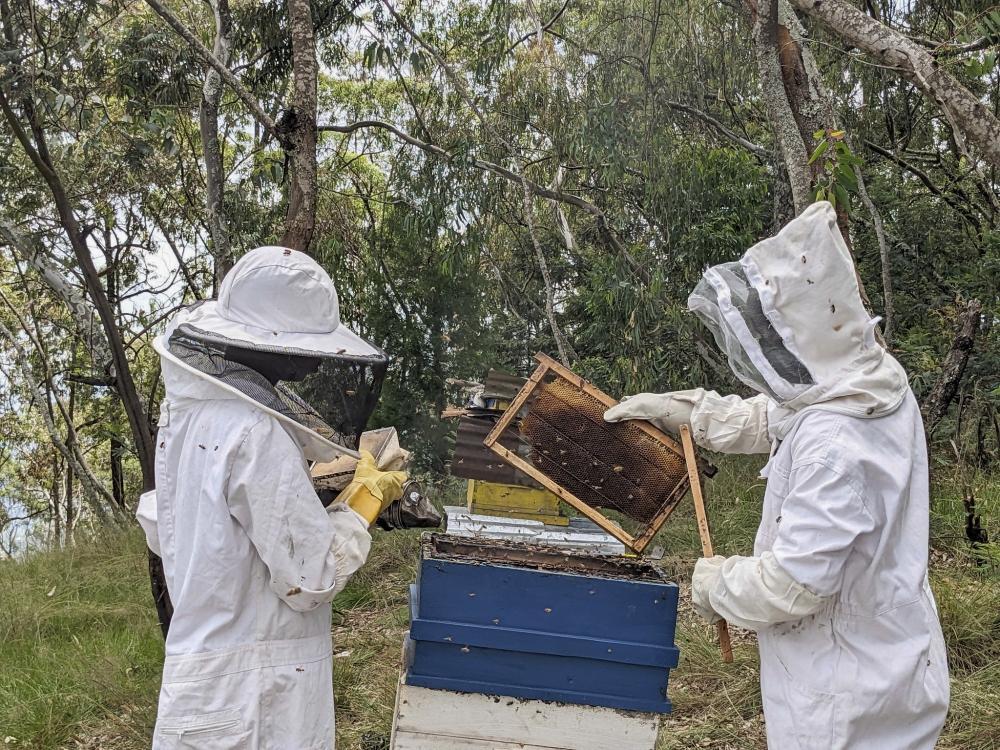Africa-Press – Rwanda. Rwanda’s Gishwati-Mukura Forest which is now a UNESCO Biosphere Reserve following its restoration has facilitated the proliferation of bees, enabling women beekeepers to generate income from honey production, according to officials and area residents.
The contribution of Gishwati-Mukura Forest to women-led beekeeping was highlighted as Rwanda celebrated World Bee Day on May 20, shedding light on the vital role of bees and other pollinators in ecosystem restoration, biodiversity conservation, and food security and nutrition. In 2019, Rwanda Development Board (RDB) took over the management of Gishwati-Mukura National Park after its rehabilitation. Previously, the park was managed by the ministry of environment.
Gishwati-Mukura National Park comprises Gishwati Natural Forest, covering 1,439.72 hectares, and Mukura Natural Forest, spanning 1,987.74 hectares. A buffer zone surrounds the park, covering an additional 992.48 hectares.
Members of a beekeepers cooperative in Gishwati. The contribution of Gishwati-Mukura Forest to women-led beekeeping was highlighted as Rwanda celebrated World Bee Day on May 20.
In 2020, Gishwati-Mukura Park was included in the World Network of Biosphere Reserves by the United Nations Educational, Scientific and Cultural Organization (UNESCO).
As part of efforts to foster biodiversity conservation and empower local communities, women beekeepers are being empowered in the area.
“Our honey production has drastically increased thanks to improved beehives. Previously, we could harvest between 200 and 300 kilogrammes of honey from 10 traditional beehives. Now, we harvest 750 kilogrammes per season from 10 improved beehives,” Emilienne Mukasine, the representative of 11 women beekeepers in the COVEB cooperative, in Mushonyi Sector, Rutsiro District, told The New Times.
“Honey production has also increased thanks to the restored forest, which now includes more vegetation species that feed the bees. Since 2023, we have received training on improving beekeeping, as well as on cooperative leadership and management,” she added.
The group of women beekeepers now supplies honey to Rutsiro Honey Ltd, a natural honey processing facility in Kinihira Sector.
“We acquired 30 modern beehives in 2023, and we currently have 127 beehives. Beekeeping is boosting women’s empowerment and contributing to family development. We also produce candles, cosmetics, and other products from honey,” she noted.
Traditionally, beekeeping has been a male-dominated vocation—a paradigm these women are determined to change.
Ezechiel Turikunkiko, an expert who oversees research and biodiversity monitoring in Gishwati-Mukura National Park, said the women are playing a vital role in protecting the park.
“As women beekeepers share their beekeeping knowledge with others in the community, they help protect bees and the biodiversity where bees thrive. A portion of tourism revenue is also being invested in beekeeping,” he said.
Marie Chantal Nyirakamineza, the Managing Director of Rutsiro Honey Company, said that the firm sources honey from the Gishwati region, including areas in Rutsiro, Rubavu, and Karongi districts.
The company started negotiations with target export markets, and the process looks promising. Potential markets include China, Germany, and the United States, where samples have already been sent.
The country is now exploring new strategies to boost its domestic honey production. As of August 2024, Rwanda’s annual honey output had reached 7,000 tonnes. The goal is to increase this to 10,000 tonnes per year.
Dominique Mvunabandi, the Director of the Science, Technology and Innovations Unit at the Rwanda National Commission for UNESCO (CNRU), told The New Times that biosphere reserves such as Gishwati-Mukura play a vital role in national honey production, as they provide an ideal environment for bees to access food.
“The ‘Women for Bees’ project aims to empower women from the World Network of Biosphere Reserves through training and the exchange of knowledge and expertise in sustainable beekeeping.
The first phase of the project in the Gishwati-Mukura Landscape Biosphere Reserve saw the graduation of 36 beekeepers—33 women and three men—representing three local cooperatives. “It included training, apiary construction, and technical support,” he explained, saying the second phase will focus on advanced training and capacity building, upgrading infrastructure, expanding market access, and promoting conservation and bee-friendly ecological restoration.
“One of the activities planned is the establishment of a botanical garden at one of the apiaries. Bee-friendly plant nurseries will also be developed near each apiary, with the aim of improving the quality and quantity of honey produced for the beneficiaries.”
For More News And Analysis About Rwanda Follow Africa-Press






